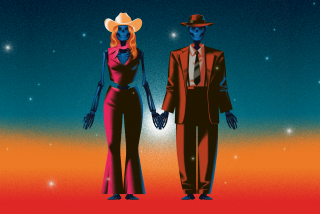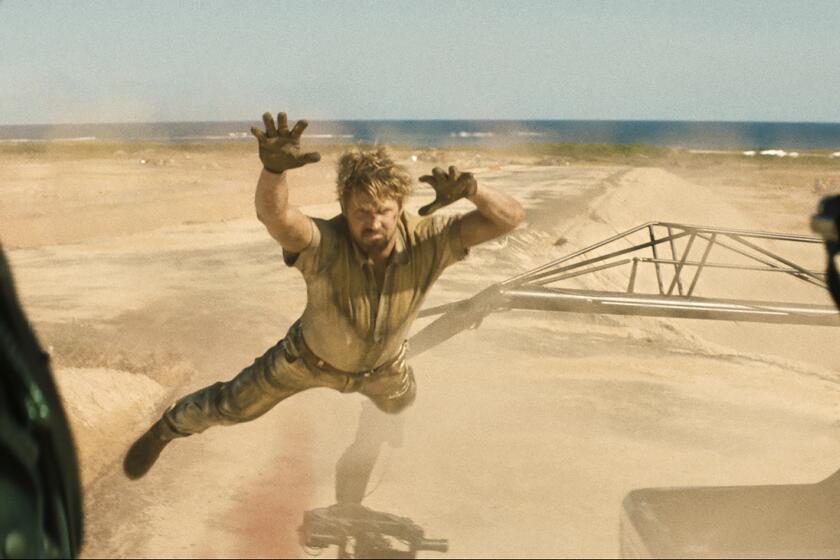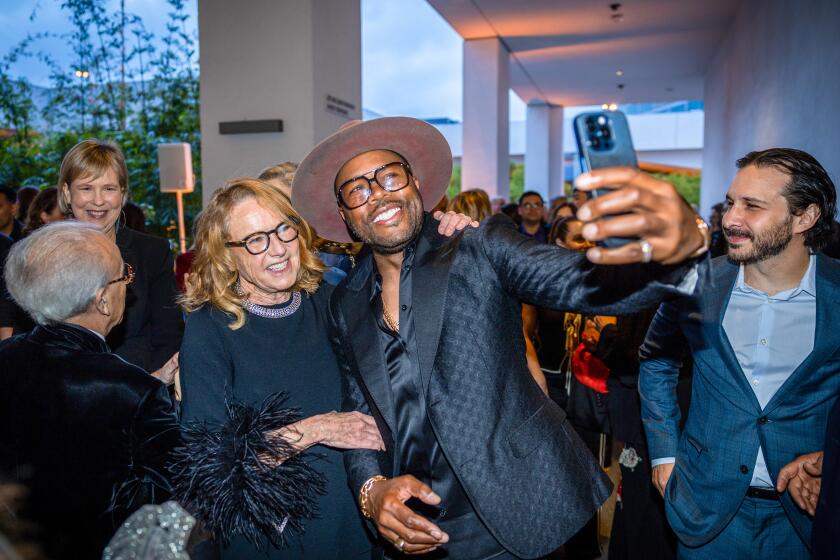Movie review: ‘POM Wonderful Presents: The Greatest Movie Ever Sold’
Ever wonder how a certain car, chip, beer, soap, well really just about any product known to man, got its 15 seconds in the movie spotlight? Money, of course, but that’s just the price of getting into the game. Filmmaker Morgan Spurlock is out to show you all the distasteful bits, raw and unprocessed, that go into making that manipulative commercial sausage in his new absurdist comic documentary (mockumentary?) “The Greatest Movie Ever Sold.”
Or more precisely, “Pom Wonderful Presents: The Greatest Movie Ever Sold,” a title that exemplifies the very thin line between art and commerce that Spurlock attempts not to cross while telling all. The pomegranate juice company paid around a million for those naming rights, a couple of actual commercials embedded in the movie and major screen time. Despite the transparency and full disclosure, and the sardonic tone detailing it, something gets lost as the distance between filmmaker and subject disappears — I think we call it objectivity.
Regardless, with Spurlock, irony, slapstick and complete immersion is as much a part of the documentary equation as information. We saw that taken to unhealthy extremes in his Oscar-nominated breakthrough, 2004’s “Super Size Me,” as he packed on pounds in showing how deadly fast-food consumption can be. There are echoes of Michael Moore in his style, but Spurlock comes across as driven more by curiosity and comic prospects than concern or outrage. That has contributed equally to his success and failure, case in point, 2008’s “Where in the World Is Osama Bin Laden.” Though Spurlock is happy to go to just about any extreme to wring the absurd out of the serious, the wit didn’t work at all in that one, probably since terrorism remains decidedly unfunny.
Product placement, on the other hand, is a far better subject for indulging those comic pursuits. With “The Greatest Movie Ever Sold” Spurlock creates a good time along with some surprisingly salient observations as he tries to keep his balance on this very slippery slope. Although much of the information may seem familiar living as we do in a culture saturated by commercial ploys, there is still a value in having someone remind you of the dangers and downsides (though I thought that was why parents were invented.)
The movie begins by laying out just how ubiquitous product placement has become, and how important it is to funding movies, with charts and graphs and too many ponderous words. The topic becomes far more engaging when Spurlock starts trying to sell the idea of funding and being a foil in his product placement documentary and doors start slamming in his face. Volkswagen will no doubt always regret that some executive put its “we don’t want anything to do with this movie” in writing, which Spurlock shares on camera to great punked effect.
To his credit he is equally transparent about his worries of being compromised himself, discussing the dilemma with quintessential consumer advocate Ralph Nader, who poses the fundamental question that lingers over the film: Are you becoming what you criticize?
Yes and no, would be the answer. Talking to both sides helps to offset the overload of products placed in “The Greatest Movie.” There are interviews with artists such as filmmakers Quentin Tarantino and J.J. Abrams, and music producers such as Big Boi and Antonio “L.A.” Reid, as they discuss the practice and its inherent pressures. There are the ad agency execs — some who hear Spurlock’s pitch, some who help Spurlock pitch. There are a series of consumer advocates and economists weighing in. There’s even a look inside Spurlock’s brain via MRI as marketers measure the effects of the manipulations. Scary.
The comedy, and there is a lot of it, is of the situational sort: Spurlock playing around with ways to integrate the horse-human crossover shampoo of Mane ‘N Tail; the filmmaker showing off his Merrell suede shoes to Nader; his Hyatt Hotel spa treatments; the string of Mini Coopers lent to the project that turn up everywhere; and the promise that writing a song for the movie will indeed make OK Go the greatest rock band because after all, “The Greatest Movie” said so.
There is a serious thread running through all the fun (though even Robert Weissman, president of Public Citizen in the very serious business of corporate accountability, can’t suppress a smile when a loud speaker plug for JetBlue punctuates his interview). One of the most startling images comes from São Paulo, Brazil, which has banned all outdoor advertising, deeming it cultural pollution. No billboards anywhere, no ads painted on buildings, a city washed clean of commercialism.
After spending a lot of time listening to Pom Wonderful executives wax on about their product and watching the beverage surface like Waldo in nearly every scene, São Paulo’s commercial-free zone comes as a huge relief. Ah, so maybe Spurlock does make his point after all.
‘Pom Wonderful presents: The Greatest Movie Ever Sold’
MPAA rating: PG-13 for some language and sexual material
Running time: 1 hour, 28 minutes
Playing: At ArcLight Hollywood
More to Read
The biggest entertainment stories
Get our big stories about Hollywood, film, television, music, arts, culture and more right in your inbox as soon as they publish.
You may occasionally receive promotional content from the Los Angeles Times.







